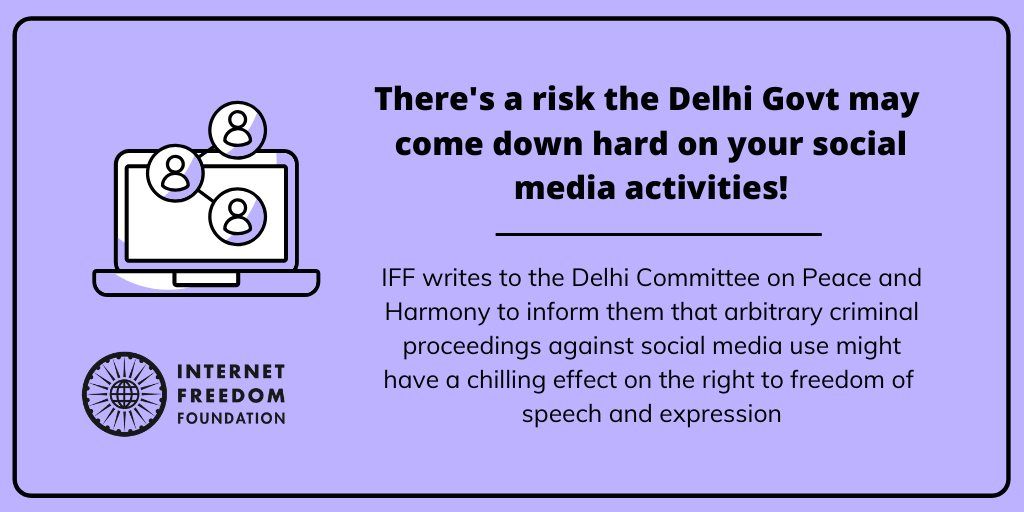
Tl;dr
Earlier this week, the Delhi Government constituted a Committee for Peace and Harmony to investigate triggers which enabled last month’s Delhi riots. The Committee has already identified the proliferation of inciteful messaging across social networking platforms as a leading cause for the coordinated violence administered across North East Delhi. As a result the Committee intends to probe online hate speech and misinformation which is shared by social media users online. After a process of validation the Committee will forward complaints to the police and relevant authorities for formal investigation/prosecution. However, the Committee’s reporting mechanism, the vague nature of the punishable activity and the degree of punishment lends itself to risks of over censorship and chilling effect. IFF has written a letter to the Committee’s chairperson along with copies to Delhi Chief Minister Arvind Kejriwal and IT Minister Kailash Gahlot. In it we have expressed concerns of how arbitrary criminal proceedings with vaguely defined grounds are incompatible with constitutional thresholds of free speech and expression. We have suggested corrective measures and apprised the Committee of established standards of incitement as articulated at international fora.
The Committee for Peace and Harmony
In response to the riots which took place in North-East Delhi last month, the Delhi Government has set up a Committee for Peace and Harmony which is being chaired by AAP MLA Saurabh Bharadwaj. The Committee also includes Abdul Rehman, Ajay Kumar Mahawar, B.S. Joon, Dilip Pandey, Jarnail Singh, Kuldeep Kumar, Atishi Marlena and Raghav Chadha. It aims to address the role of misinformation and incitement to violence in the riots. The Committee also aims to stop any further incitement of communal tensions.
The Committee has publicised that the criminal punishment for spreading fake news or “hateful content” will be imprisonment of 3 years. What is troubling is that the exact provision or law under which such specific punishment is being articulated remains unknown. This is especially concerning since the punishment being discussed would be equally applicable to people who forward or amplify the information, as compared to the actual source of origin. This runs the risk of arbitrary enforcement and could see people being sent to jail for speech which is supposed to be constitutionally protected.
In addition the mechanism through which the Committee takes up incidents to investigate is questionable. Specifically, the Committee has asked the public to report any such messages and corresponding individuals to authorities via whatsApp or email. People who report incidents against which FIRs are filed will receive a reward of Rs. 10,000. Such incentive structures will see the public have a bias towards reporting individuals to authorities.
We are concerned that this may lead to people getting unfairly prosecuted against. Moreover, we are concerned about this leading to excessive censorship and may lead to a widespread chilling effect on people’s speech and expression. One positive safeguard the Committee contemplates is seeking the advice of legal, technological and fact checking experts before forwarding complaints to police and other relevant authorities. As on March 06, 2020 the Peace and Harmony Committee has already received more than 950 complaints of people spreading hateful content/fake news.
IFF’s recommendations
While the aim of the Committee is commendable, it also has to be ensured that any restrictions on speech fall within constitutional parameters of “reasonableness” and “proportionality.” Thus, in order to remedy the inherent risks associated with the Govt of NCT of Delhi’s Committee on Peace and Harmony IFF recommends that:
- FIRs are filed only when an offence is made out under Sections 153 A, 153 B, 295A and 505 of the Indian Penal Code, 1860 which are the relevant provisions under Indian criminal law addressing hate speech and incitement.
- The Committee carefully considers whether the complaints received by it satisfy constitutional standards relating to proximity and imminence of harm prior to recommending criminal action against individuals. Through safeguards it should ensure that constitutionally protected forms of speech such as advocacy and discussion (even if they are threatening, shocking or disturbing in nature but not amounting to incitement) are not trampled upon. People’s ability to engage in legitimate speech deserve protection even in these trying times.
- The Committee should follow thresholds of incitement articulated by international human rights forums. In this regard, the Rabat Plan of Action developed by the Office of the UN High Commissioner for Human Rights in 2013 suggests key factors that must be considered prior to imposing restrictions on speech:
- Social and political context which existed at the time the speech was made.
- Speaker’s position and status in society.
- Content and form of the speech.
- Reach of the speech act including the size of its audience and mode of dissemination.
- Likelihood and imminence of harm.
- The Committee must be careful that its investigations on the dissemination of false information is administered in a manner where the incidents are connected to actual incitement.
- The Committee must take cognizance of speeches made by political leaders in public gatherings immediately, prior to and during the riots which called for violence. This is important even from the perspective of thresholds like incitement since such actors have greater public influence and have very tangible capabilities in mobilising people towards specific action.
In order to help people’s constitutional guarantees like their right to freedom of speech and expression, IFF has informed the Committee that we are available to provide legal expertise, if required. Our expertise in online censorship can help the Committee distinguish between actual instances of incitement against other instances where a forward or retweet falls under constitutionally protected forms of speech.
Important Documents
- IFF’s Letter to the Delhi Committee on Peace and Harmony. (link)
Offensive speech need not be hate speech. Want your elected officials to understand that distinction? Join us in fighting for people’s fundamental rights online by becoming a member today!
